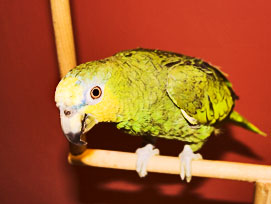
The best diet for Amazons should be based mainly on pellets, with a good mix of vegetables, fruits and seeds just for variety and additional nutrients. Your veterinarian will be able to recommend brands, and give detailed instructions on how much your bird needs. Bear in mind that if you are breeding Amazon parrots, you may need to change their diet during mating season.
Pellets are specially designed to provide birds with most of the vitamins and minerals they need, while minimizing the fat found in seeds. Remember that domesticated birds simply do not get the same level of exercise they would have in the wild. They may also need additional vitamins to boost their immune system, since they are in different a climate or environment, and exposed to a number of “foreign’ viruses and bacteria.
Seeds should compose only about 10% of the total diet. Provide these in the afternoon, after the bird’s eaten its pellets. If you’ve inherited an older bird that’s gotten used to seeds, just mix seeds and pellets for the first 2 weeks, then gradually decrease the amount of seeds.
Fruits and vegetables should be served in the morning in a separate dish. While birds all have their own unique preferences, most will enjoy apples (remove the seeds!), plums, grapes, cherries, bananas, mangos, papayas and berries. Limit citrus fruits like oranges to twice a week. They also like zucchini, cucumbers and cabbage.
Amazons have a tendency to develop Vitamin A deficiency, so be sure to include dark green leafy vegetables, carrots, and sweet potatoes. Never give avocado, which is toxic to birds! Other no-nos are broccoli, chocolate, caffeine and alcohol. There is also research that too much soy products can be harmful, so either limit the servings or avoid them altogether.
Be sure to wash all fruits and vegetables very well. Amazon parrots may become sick or weak if they are exposed to chemical fertilizers or insecticides. It is much better to feed them organic food, or serve them produce grown right in your own back yard.
You can also offer protein every other week. Good sources include hard boiled eggs, canned dog food, and cottage cheese. However, these foods do spoil easily, especially in hot temperatures. Serve them in the morning and remove before lunch time.
Limit the bird treats to training sessions. While all birds enjoy a special snack once in a while, if they have easy access to them, they may refuse to finish their “regular” food.